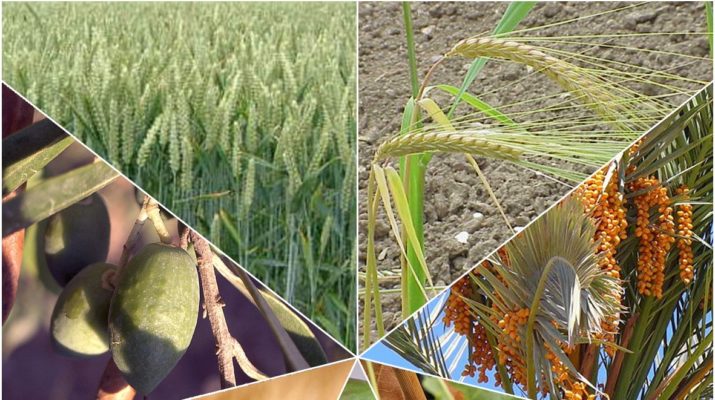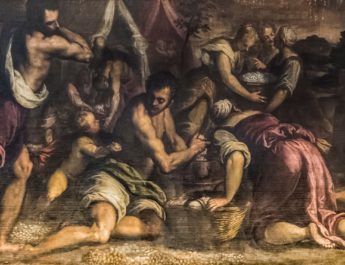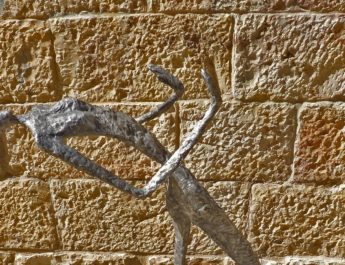Leviticus 2
BibleHub
1 “When anyoneA presentsB a grainC offeringD to the Lord,E the offering shall beF of choice flour;G
Notes on verse 1a
A “anyone” = nephesh. Related to naphash (to refresh or be refreshed). This is soul, self, person, emotion. It is a breathing creature. Can also refer to appetites and desires.
B “presents” = qarab. This is to come near, offer, make ready, approach, take.
C “grain” = minchah. This is a gift or an offering, particularly a sacrificial one that is generally bloodless and given spontaneously (voluntarily).
D “offering” = qorban. Related to “presents” in v1. From qarab (see note B above). This is an oblation or offering – a sacrifice.
E “Lord” = YHVH. From havah (to be, become) or hayah (to come to pass, become, be). This is the name of the God of Israel, the self-existent and eternal one, the tetragrammaton. This pronunciation has been lost to time so “Lord” is generally used in its place.
F “be” = hayah. Related to “Lord” in v1. See note E above.
G “choice flour” = soleth. It may come from a word that means to strip. This is fine flour.
the worshiper shall pourH oilI on it and putJ frankincenseK on it
Notes on verse 1b
H “pour” = yatsaq. This is to pour out, flow, wash away, or overflow. It can imply melting as one does to cast metal. By extension, it can refer to something being steadfast, stiffened, firmly in place.
I “oil” = shemen. From shamen (to shine, which implies being oily, growing fat). This is fat, oil, grease, olive oil – often with perfume. Used figuratively for fertile, lavish, rich.
J “put” = natan. This is to give, put, set, offer. It is to give literally or figuratively.
K “frankincense” = lebonah. From laban (white); from laben (to be or make white, to make bricks). This is frankincense – it may be because it is white itself or because its smoke is.
2 and bringL it to Aaron’sM sonsN the priests.O
Notes on verse 2a
L “bring” = bo. This is to enter, come in, advance, fulfill, bring offerings, enter to worship, attack. It can also have a sexual connotation.
M “Aaron’s” = Aharon. Derivation uncertain. May mean “bearer of martyrs” OR be related to Ancient Egyptian ꜥḥꜣ rw (warrior lion) OR elevated, exalted, high mountain. This is Aaron. See https://en.wiktionary.org/wiki/Aaron
N “sons” = ben. From banah (to build or obtain children). This is son, age, child. It is son in a literal or figurative sense.
O “priests” = kohen. This is literally the one who officiates i.e. the priest. This is where the Jewish last name “Cohen” (and its variants) comes from.
After takingP from it a handfulQ of the choice flour and oil, with allR its frankincense, the priest shall turn this token portionS
Notes on verse 2b
P “taking” = qamats. 3x in OT. This is to take or grasp with one’s hand.
Q “handful” = melo + qomets. Melo is from male (fill, satisfy, replenish, accomplish, fulfill, confirm, or consecrate; fill in a literal or figurative sense). This is fullness in a literal or figurative sense. Qomets is related to “taking” in v2. 4x in OT. From qamats (see note P above). This is a fist or handful. It can also mean abundantly.
R “all” = kol. From kalal (to complete). This is all or every.
S “token portion” = azkarah. 7x in OT. From zakar (o remember, to mark something so that it can be recalled, to be mindful of, to mention). This is a token portion or memorial offering.
into smokeT on the altar,U an offering by fireV of pleasingW odorX to the Lord.
Notes on verse 2c
T “turn…into smoke” = qatar. Perhaps from qetoreth (smoke, incense, the scent of the sacrifice as it burned); from the same as qitor (thick smoke, vapor). This is to make an offering, particular one of burned incense. It focuses on the fragrance made from the sacrificial fire. This is generally used to refer to worship.
U “altar” = mizbeach. From zabach (to kill, slay, offer; slaughtering an animal to offer as a sacrifice). This is an altar.
V “offering by fire” = ishsheh. From eshshah (a fire); from esh (fire, burning, flaming, hot; fire in a literal or figurative sense). This is an offering by fire or a burnt offering. More broadly, it can refer to any kind of sacrifice.
W “pleasing” = nichoach. From nuach (to rest, calm, camp, free, place, remain, satisfy, settle, station, or wait; implies settling down in a literal or figurative sense). This is soothing, restful, sweet, pleasant.
X “odor” = reyach. From ruach (to blow, breath; smell, anticipate; figuratively, to perceive, understand). This is a scent or breath – a savor, ointment. It is also used for the odor of sacrifices that pleases God.
3 And what is leftY of the grain offering shall be for Aaron and his sons, a most holyZ part of the offerings by fire to the Lord.
4 “When you present a grainAA offering bakedBB in the oven,CC it shall be of choice flour:
Notes on verses 3-4a
Y “what is left” = yathar. This is to jut over, remain behind, preserve, to excel. It can be to leave or to be in abundance.
Z “most holy” = qodesh + qodesh. Literally, “holy of holies.” This is set apart and so sacred. God is different from us and so God is holy/set apart. Things we dedicate to God’s service are set apart for God and so they, too, are holy, etc.
AA “grain” = minchah. Same as “grain” in v1. See note C above.
BB “baked” = maapheh. 1x in OT. From aphah (one who cooks or bakes – particularly one who cooks meat). This is something baked.
CC “oven” = tannur. 15x in OT. From the same as tenuk (ear lobe, pinnacle, extremity); perhaps from the same as anak (plumb line, hook; root may mean to be narrow) OR from ner (properly, to glisten; a lamp, light, burner, candle; light literal or figurative). This is a portable stove, oven, or furnace.
unleavenedDD cakesEE mixedFF with oil or unleavened wafersGG spreadHH with oil.
Notes on verse 4b
DD “unleavened” = matstsah. From matsats (to drain out). This is unleavened bread – bread that is sweet rather than becoming sour with the flavor of yeast. Can also be used to refer to the festival of Passover, the staple food of which is commonly transliterate matzoh from this word.
EE “cakes” = challah. 14x in OT. From chalal (to pierce, which implies to wound; used figuratively for making someone or something profane or breaking your word; to begin as though one opened a wedge; to eat something as a common thing). This is a cake offered up in the Tabernacle/Temple.
FF “mixed” = balal. This is to anoint, mix, overflow. It can also be to fodder or temper
GG “wafers” = raqiq. 8x in OT. From the same as raq (thin, surely, only); perhaps from raqaq (to spit). This is a thin cake or wafer in the Tabernacle/Temple.
HH “spread” = mashach. This is smear, paint, spread, or paint. It can also be to rub with oil or, otherwise stated, to anoint. This implies a consecration. This root verb is where the word “messiah” comes from.
5 If your offering is grain prepared on a griddle,II it shall be of choice flour mixed with oil, unleavened; 6 breakJJ it in piecesKK and pour oil on it; it is a grain offering. 7 If your offering is grain prepared in a pan,LL it shall be madeMM of choice flour in oil. 8 You shall bring to the Lord the grain offering that is preparedNN in any of these ways,
Notes on verses 5-8a
II “griddle” = machabath. 5x in OT. From the same as chabittim (may be from a word that means to cook; it is fried dough – a flat cake or wafer). This is a griddle or baking pan.
JJ “break” = pathath. 1x in OT. This is to open or crumble.
KK “in pieces” = path. Related to “break” in v6. 15x in OT. From pathath (see note JJ above). This is piece or morsel.
LL “pan” = marchesheth. 2x in OT. From rachash (to stir, overflow). This is a pan or frying pan.
MM “made” = asah. This is to make, do, act, appoint, become in many senses.
NN “prepared” = asah. Same as “made” in v7. See note MM above.
and when it is presented to the priest, he shall takeOO it to the altar. 9 The priest shall removePP from the grain offering its token portion and turn this into smoke on the altar, an offering by fire of pleasing odor to the Lord. 10 And what is left of the grain offering shall be for Aaron and his sons; it is a most holy part of the offerings by fire to the Lord.QQ
11 “No grain offering that you bringRR to the LordSS shall be made with leaven,TT
Notes on verses 8b-11a
OO “take” = nagash. This is to draw, bring, or come near. It is approaching for any reason – as an attack on an enemy, in order to worship, to make an argument. It can also be used as a euphemism for sex.
PP “remove” = rum. This is to rise or raise, to be high literally or figuratively. So it can also mean to exalt or extol.
QQ “Lord” = YHVH. Related to “Lord” and “be” in v1. See note E above. Same meaning as “Lord,” but with a different vowel pointing.
RR “bring” = qarab. Same as “presents” in v1. See note B above.
SS “Lord” = YHVH. Same as “Lord” in v1. See note E above.
TT “leaven” = chamets. 13x in OT. From chamets (be or taste sour, fermented, harsh; dyed or of a dazzling color; cruelty). This is leaven or something leavened. It can refer to bread or extortion.
for you must not turn anyUU leavenVV orWW honeyXX into smoke as an offering by fire to the Lord.YY
Notes on verse 11b
UU “any” = kol. Same as “all” in v2. See note R above.
VV “leaven” = seor. 5x in OT. Perhaps from sha’ar (properly, swelling up i.e. being left over; a remnant, remaining, being redundant). This is leaven or barm.
WW {untranslated} = kol. Same as “all” in v2. See note R above.
XX “honey” = debash. Root may mean being gummy. This is honey or honeycomb because it is so sticky. It can also refer to syrup.
YY “Lord” = YHVH. Same as “Lord” in v1. See note E above.
12 You may bringZZ them to the LordAAA as an offering of choice products,BBB but they shall not be offeredCCC on the altar for a pleasing odor.
Notes on verse 12
ZZ “bring” = qarab. Same as “presents” in v1. See note B above.
AAA “Lord” = YHVH. Same as “Lord” in v1. See note E above.
BBB “choice products” = reshith. From rosh (head, captain, or chief; excellent or the forefront; first in position or in statue or in time). This is beginning, first place, highest rank, chief thing.
CCC “offered” = alah. This is to go up, approach, ascend, be high, be a priority; to arise in a literal or figurative sense.
13 All your grain offerings you shall seasonDDD with salt;EEE you shall not omitFFF from your grain offerings the salt of the covenantGGG with your God;HHH with all your offerings you shall offer salt.
Notes on verse 13
DDD “season” = malach. Related to “salt” in v13. See note EEE below.
EEE “salt” = melach. Perhaps from malach (properly, to pulverize, temper together, dissipate; also to season or salt). This is powder; used for salt or salt pit.
FFF “omit” = shabat. This is to rest, stop, repose, cease working. By implication, it is to celebrate.
GGG “covenant” = berit. Perhaps from barah (to eat, choose, make clear); perhaps from bar (grain, wheat); from bara (to select, purify, cleanse, test, brighten, polish). This is a compact, covenant, alliance, treaty, or league.
HHH “God” = Elohim.
14 “If you bringIII a grain offering of first fruitsJJJ to the Lord,KKK you shall bringLLL as the grain offering of your first fruits crushedMMM new grainNNN
Notes on verse 14a
III “bring” = qarab. Same as “presents” in v1. See note B above.
JJJ “first fruits” = bikkurim. 18x in OT. From bakar (to bear fruit, be firstborn, firstling, that which opens the womb, give the birthright to). This is first fruits – fruit that ripens earliest.
KKK “Lord” = YHVH. Same as “Lord” in v1. See note E above.
LLL “bring” = qarab. Same as “presents” in v1. See note B above.
MMM “crushed” = geres. 2x in OT – both in Leviticus 2. May come from a word that means to husk. This is crushed or beaten corn. It is a kernel and so can refer to grain.
NNN “new grain” = karmel. 15x in OT. From the same as kerem (vineyard, garden, vines, or a vintage). This is a fertile field, garden, new growth, fruit, grain. It can be an orchard or park as well as the produce.
from fresh ears,OOO roastedPPP in fire.QQQ 15 You shall addRRR oil to it and laySSS frankincense on it; it is a grain offering. 16 And the priest shall turn a token portion of it into smoke—some of the crushed grain and oil with all its frankincense; it is an offering by fire to the Lord.TTT
Notes on verses 14b-16
OOO “fresh ears” = abib. 8x in OT. This is a young ear or green head of grain. It is also the name of a month – Abib.
PPP “roasted” = qalah. 4x in OT. This is to roast, toast or parch – to dry or scorch in part.
QQQ “fire” = esh. Related to “offering by fire” in v2. See note V above.
RRR “add” = natan. Same as “put” in v1. See note J above.
SSS “lay” = sim. This is to put or place in a literal or figurative sense. It can be appoint, care, change, make, and may other things.
TTT “Lord” = YHVH. Same as “Lord” in v1. See note E above.
Image credit: “The Seven Species” by Rollig, 2009.



